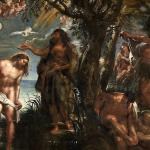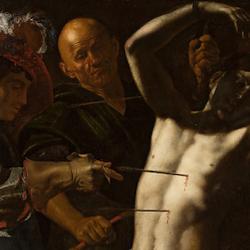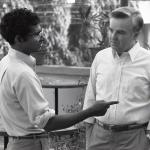Gatherings of the ancient Athenian citizen assembly began with the sacrifice of a pig and the sprinkling of blood to consecrate a sacred space. When a Roman emperor wanted to discover the future, he sacrificed an animal and dispatched a specialist to read the entrails. It’s been a long time since sacrifice was so intimately connected to political life, and, as I argued in Defending Constantine, we have Constantine to thank for that.
A number of recent writers, however, have raised uncomfortable questions about whether we have come so far from the classical world as we believe. In Why Politics Can’t Be Freed From Religion (Blackwell, 2010), Ivan Strenski “interrogates” our understanding of both religion and politics to show how intertwined they continue to be. Strenski wants to know why the nation-state, “an otherwise worldly institution, defined by its monopolization of the use of force . . . , assume[s] a religious character? Why does it become, for example, the focus of absolute obedience, for which individual citizens not only do sacrifice their lives, but also feel that they are obliged so to do?”
His answer, after a summary of the history of contests between Pope and Emperor in the medieval West, is that the modern nation-state is a “transformed Church” (the phrase comes from Louis Dumont).
One of the most powerful statements of this theme comes from Paul W. Kahn’s Putting Liberalism in Its Place. Kahn, who teaches law at Yale, argues that liberalism does not have the intellectual tools to understand itself. What gets ignored, he argues, is the political significance of love and especially of love expressed in sacrifice.
Kahn’s title might be misconstrued. He does not use “liberalism” in the sense that the word is used on talk radio, as the opposite of “conservatism.” Rather, Kahn has in mind the political order that characterizes today’s Western nation-states, and within which both conservatives and liberals operate.
Liberal theory assumes that the individual is the elementary unit of analysis and political discourse, and makes a sharp distinction between the public realm, which is the sphere of reasoned discourse, and the private realm, the sphere of irrational, ungrounded loves and loyalties. Because of these precommitments, liberal theorists miss fundamental realities of political life.
Liberalism cannot, for instance, make any sense of the family. According to liberal theory, the family is confined to the private sphere, but families have public dimensions and aspirations (most obvious in dynasties like the Kennedys and Bushes). Parents teach their children to become good citizens; historically, women have contributed to war efforts by bearing sons. Politicians appear in public surrounded by beaming wife and perfect kids. Families just won’t stay put in a private confine.
Nor can liberalism make sense of children. Children are not self-standing individuals, but enter the world already embedded in a social setting and a polity. Since we were all children, it’s difficult to find a single instance of a liberal “individual.”
In theory, liberalism consigns “love” to the private sphere too, but Kahn argues that love is actually a foundational dimension of political life. Political rhetoric is full of the rhetoric of love. Patriotism is a form of love. Out of love comes sacrifice, which Kahn views as a primordial political reality, even in our “rational” modern politics. The liberal state claims to be an ultimate value and hence makes ultimate demands on its citizens. At any time, the liberal can call on its citizens to sacrifice themselves for the sake of maintaining the way of life of the particular nation-state. It can call on citizens to kill and be killed.
For Kahn, political sacrifice is one of the central innovations of modern polities. He writes, “The modern nation-state has shown itself to be an extremely effective instrument of sacrifice. It has been able to mobilize its population to make sacrifices in order to sustain the states own historical existence.” More sharply, “The immense capacity of the nation-state to sacrifice its citizens in war was the great political discovery of the nineteenth century. That discovery begins with Napoleon’s armies inheriting the popular enthusiasm of the Revolution; it was further revealed in the American Civil War, when democratic armies based on mass conscription confront each other for the first time.”
In modern states, citizenship is defined as “a willingness to respond to the demand for sacrifice for the continued existence of the state.” This might involve sacrifice of being killed, or the sacrifice of certain private interests for the sake of the common good, the survival of the liberal state (“ask not what your country. . .”).
Theoretically, there is no limit to what the state might demand. Modern states assume the “autonomy of the political,” an autonomy that cannot be rightly checked by any other power. Modern states have assumed the mantle of “sovereignty” that once belonged to God. Like God in traditional theology, they claim power over life and death, and few are willing to talk back. Liberal states are not totalitarian; but they make total demands.
Kahn’s analysis of the sacrificial basis of modern politics is especially challenging for Christians, since what is lost in modern sacrificial politics is the original form of political sacrifice in Western history, the sacrifice of martyrdom. Originally, martyrdom was a break on state power.
The early Christian martyrs unmasked the pretensions of the Roman empire by showing that “the state and its claim to power [was] nothing at all. In the end, sacrifice is always stronger than murder. The martyr wields a power to defeat his murderer, which cannot be answered on the field of battle.” Kahn finds a secular form of martyrdom today in “the politics of human rights or the nonviolent resistance of the civil rights movement.”
But that is not the dominant thread of modern martyrdom: “The domain of sacrifice shifted [in modern politics] from that of religious resistance to the state to that of political patriotism. Modern stories of sacrifice are less likely to be of religious resistance to the state than of individuals whose faith in the ‘truth’ of the state – the popular sovereign – fuels an ultimate resistance against those who make ‘false’ claims to represent the people. For Americans, Lincoln becomes the great image of the martyr – a politicized Christ. Martin Luther King, Jr., too is celebrated not for his adherence to a religious claim to truth in resistance to the state, but as a sacrificial patriot in the Lincolnesque tradition.”
Kahn pushes further to point out the 20th century was not, as often believed, a secular age, but “was marked by the magnitude of its faith, and even by the extreme character of the sacrificial demand made by political communities of ultimate belief. Western nation-states became grand institutional structures for the sacrifice of their citizens to the idea of the necessity of the state’s continued existence. Only under such an idea can we begin to make sense of the millions sacrificed on the battlefields of Europe, let alone the extension of the battlefield to the entire territory of the state. The modern state coopts the act of sacrifice to its own ultimate end, which is only the continued existence of the popular sovereign.”
Christians in the modern age have often ridden the wave of sacrificial politics, and American Christians have shown as little resistance as any. Christians are among the most patriotic Americans. So seamless is our union of American ideals with Christianity that it is difficult for us to consider even the possibility that our nation is a sacrificial system competing with God and the church for our loyalty.
It is virtually unthinkable that God might call us to the sacrifice of martyrdom in opposition to America rather than to sacrifice in defense of America. No wonder activist Christians are so readily folded back into the system. Until we get sacrifice straight, until there are actual martyrs, witnesses whose witness costs something, our resistance to statism will remain anemic.
















